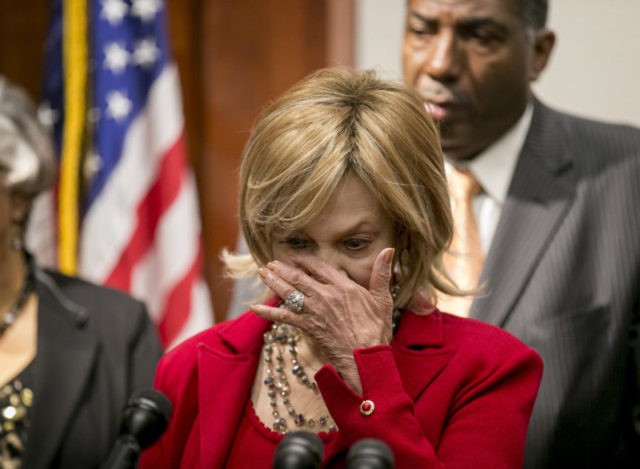AUSTIN, Texas (AP) — Top Texas Democrats on Thursday decried Republican Gov. Greg Abbott’s muted response to the fatal shooting of a black teenager by a white police officer outside a suburban Dallas house party, which follows his far more spirited response to subsequent stabbings at the University of Texas and the shooting of a paramedic.
Rising tensions between Abbott and Democrats in the Legislature come as high-profile proposals to discourage shootings by police in Texas — which disproportionately involve black victims — have stalled.
State Rep. Helen Giddings said blacks make up only 13 percent of Texas’ population but constituted 37 percent of the unarmed people shot by police statewide last year.
“This is not a Dallas problem, this is not a Balch Springs problem,” Giddings, a Democrat from Dallas, said Thursday at a news conference at the Texas Supreme Court building in Austin. “It is a dangerous disease that is threatening young black males, most of whom are unarmed.”
Abbott had not said anything publicly about the death of 15-year-old Jordan Edwards until Thursday, when he responded to The Associated Press with a brief statement that was not released broadly. The governor said his “heart goes out to the Edwards family during this incredibly difficult time.” His statement added, “No parent should ever have to experience the pain of losing a child, and the Edwards family deserves a fair and full investigation into this tragedy.”
Edwards and his two brothers and two other teenagers were driving away from an unruly house party in Balch Springs late Saturday night when Officer Roy Oliver opened fire on their vehicle with a rifle. The bullets shattered the front passenger-side window and struck Edwards. Oliver was fired Tuesday.
It took a few moments for Edwards’ 16-year-old brother, who was driving, and other passengers to notice that he was slumped over in his seat. His brother pulled over and tried to call for help.
Police ordered him to step out of the car and back away. As he moved, he heard someone call him a racial slur, according to family lawyers Jasmine Crockett and Lee Merritt.
After Dallas paramedic William An was shot and critically wounded Monday, and a University of Texas student was killed and three others wounded in a knife attack, Abbott responded that day by offering “all available state resources to both Dallas and the University of Texas to assist in any effort.”
Dallas Democratic Rep. Rafael Anchia, chairman of the Legislature’s Mexican-American Legislative Caucus, said Texas Republicans, including Abbott, need to do more about police shootings.
“Instead of muted responses, we need full-throated responses to deal not only with this situation but … with this broader problem,” Anchia said.
Added: Rep. Chris Turner, head of the Democratic Caucus in the state House: “It’s not simply enough to send our thoughts and prayers. We need action.”
“If this was a group of white kids, this story would have had a different ending,” said Turner, who is from Grand Prairie in suburban Dallas.
Democrats have sought changes in an effort to address police shootings, but few of the proposals before the Legislature are likely to pass before the session ends on May 29.
One bill is named for Sandra Bland, a black woman died in a jail near Houston following a confrontational traffic stop in 2015. It originally would have revamped racial profiling laws, officer training and other police accountability measures. But it has been watered down substantially in recent weeks — and still may not pass.
One issue in the Edwards shooting is that the official police account changed. In a statement Sunday, police said the vehicle carrying Edwards was backing up toward officers “in an aggressive manner.” But Oliver was fired after body camera video showed that the car was actually driving away from officers.
State Sen. Royce West of Dallas called for a meeting with Abbott to discuss ensuring that more police in Texas wear body cameras while on duty.
“I’m not playing the race card,” West said. “I’m playing the reality card.”
___
Associated Press writer Paul J. Weber contributed to this report.

COMMENTS
Please let us know if you're having issues with commenting.